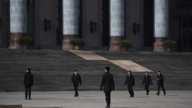【新唐人2013年11月16日訊】十八屆三中全會期間,中國歷史學者章立凡和政治學者張鳴,這兩位網絡知名人士的微博被封,並且《新浪》處理了10萬多個微博帳戶。章立凡在去年曾經針對中共提出「五年看改,十年看埋」。大陸評論人士認為,三中全會名義上是改革,實際上更進一步收緊了對民眾的打壓控制。
11月12號,也就是三中全會閉幕當天,北京歷史學者章立凡幾個微博帳號被註銷,微博內容全部遭到刪除,他的幾個博客網頁也遭到封殺。
章立凡微博被封之後,「中國抗戰文化基金」副理事長賈元良通過微博向公眾披露此事,並且獲得 轉發上千次。很多網友對當局的行為表示不解。
中國抗戰文化基金副理事長賈元良:「我認為有關方面對章立凡和張鳴先生有關言論進行封殺,我認為是一件不太妥的事情。俗話說,有自信者當自強。這種禁言的方式與當前大的形勢,特別是互聯網時代的開放性,極不協調。」
章立凡今年63歲,父親章乃器在1957年中共反右運動中,被視為「四大右派」之一,而受到迫害。
賈元良:「章立凡先生是章乃器先生的後代,章乃器也是中國民主史上一個重要人物。當年曾經在中共建國時期給了中共很大幫助。我認為章先生也是從歷史角度來警示中共方面,應該開放言論。現在已經是互聯網時代了。」
近年來,章立凡在《新浪》網上發表了1萬7千條有關歷史和時事的微博,其中主要內容在批判毛澤東、和呼籲中國進行政治改革。章立凡曾在微博上請網友就「否定了毛澤東,中國 的未來怎樣?」進行投票。
章立凡去年一月提出「五年看改,十年看埋」的驚人言論。他說,「如果下一屆核心在第一個任期內,不能啟動政治體制改革的話,也就無須啟動了。」他表示,中國不危險,但是中共真的很危險。「現在中共所面臨的局面是,已經很少有人為執政黨的未來著想。不少黨員都在謀私利。」
山東自由作家鞏磊表示,三中全會雖然號稱「改革新起點」,但是從肅殺微博的動作來看,當局正在進一步控制輿論,打壓民間聲音,收緊對公民的控制。
山東自由作家鞏磊:「這一次三中全會並沒有在言論自由上,結社自由上有新的進展。並且成立甚麼國安委,反而進一步加緊對國內各種議題的控制,對民眾呼聲的控制。三中全會實際上,名義上是改革,實際上更進一步收緊了對民眾的打壓控制,是越來越反動,越左的一種這樣一種措施。」
11月12號,《騰訊》一些網友開始互相轉告張鳴在《騰訊》微博中被禁言的消息。張鳴是「中國人民大學」政治系教授和博士生導師。最近張鳴就「三中全會」發表多條評論,其中之一內容是:只要公有制經濟還是主體,就不可能有甚麼市場的主體地位,市場只能成為權貴的撈錢機器,這樣的市場,注定是扭曲的。
實際上,張鳴過去在《新浪》網上的微博帳號已被註銷。去年1月7號,張鳴宣佈離開《新浪》微博。張鳴發消息說:「是到了離開《新浪》的時候了,這些年來,在 《新浪》開微博,受盡了窩囊氣。」他表示,會轉戰《搜狐》、《網易》和《騰訊》繼續開微博,未料到,如今在《騰訊》上的微博也折戟沉沙。
據大陸媒體《北京青年報》報導,國內最大微博平臺《新浪》微博,近期處理了10萬所謂違反「七條底線」的微博帳戶。處理的方式包括禁言、永久封帳號等。
今年8月10號,中國互聯網信息辦公室主任魯煒跟十多位網絡「大V」名人舉行座談。魯煒對網絡名人提出六點希望,要求他們堅守所謂「七條底線」。與會者包括擁有上百萬「粉絲」的薛蠻子、和潘石屹等人。
採訪編輯/秦雪 後製/孫寧
The Third Plenum: A New Wave of Tightened Censorship
During the Third Plenary Session, Chinese historian
Zhang Lifan and political scientist Zhang Ming
have both experienced the new wave of censorship.
Their microblogs were closed, along with more than
100,000 other blog accounts deleted
by the Chinese microblog social networking site, Sina Weibo.
Zhang Lifan had a famous saying in 2012,
“Reform in five years, or be buried in 10 years."
Our commentators believe that the Third Plenum,
in the name of reform, conducts further repression.
November 12, the closing day of the plenary, several Weibo
accounts of Beijing historian Zhang Lifan were canceled.
All of the content was removed and
several of his blog sites were blocked.
After Zhang Lifan’s Weibo was blocked, vice chairman
of the Second Sino-Japanese War history foundation
Jia Yuanliang discolsed this mattter to the public via
an Internet post.
Many Internet users forwarded the post
and expressed their disbelief.
Jia Yuanliang, vice chairman of the Second Sino-Japanese
War history foundation: “I don’t think it’s appropriate
to block the remarks of Zhang Lifan and Zhang Ming.
There is an old saying, the confident one is strong.
Censorship is incompatible with the Internet era."
Zhang Lifan is 63 years old.
His father, Zhang Naiqi was persecuted after he was labeled
a right winger in the 1957 anti-rightist movement
of the Communist Party (CCP).
Jia Yuanliang: “Mr. Zhang Lifan is Mr. Zhang Naiqi’s son.
Zhang Naiqi was an important figure in the founding period
of the CCP and in the history of democracy in China.
I believe Mr. Zhang intended to tell the regime that
in the Internet era it is time to talk freely."
Zhang Lifan has over 17,000 posts on-line in these years.
He has commented on Mao Zedong
and appealed for political reform.
He once conducted an online survey with the question,
“What is China’s future if Mao Zedong is negated?"
Zhang Lifan posted his astonishing statement last January,
“Reform in five years, or be buried in 10 years."
He stated, “If the new leadership does not initiate political
reform in the first term, there is no need to start."
He wrote that China is not in danger, but the CCP is.
“The CCP is faced with very few people
who would care for its future.
Many are self-serving."
Shandong freelance writer Gong Lei believes that even though
the CCP claimed the Third Plenum is “the new starting point
for reform," the blocking of Weibo suggests the CCP
is tightening censorship, control and repression of the society.
Gong Lei, Shandong freelance writer:
“The Third Plenum improves nothing.
Instead of freedom of speech and association, it tightens
control of domestic issues by setting up a state security committee.
In the name of reform, the meeting actually strengthens
the suppression of the public, restriction of activities,
and the leftist ideal."
November 12, a post stated that Zhang Ming’s accounts
on Tencent, a web portal, had been blocked.
Zhang Ming, a political science professor of Renmin
University of China, had recently issued a number
of comments on the Third Plenum.
One of them reads, “As long as the public ownership
remains dominant, the market will only be secondary,
a wealth generating machine for the rich and powerful,
and distorted."
In fact, Zhang Ming’s Sina Weibo accounts
had been canceled.
Last January 7, Zhang Ming posted that he was leaving Sina.
“Time to leave Sina," he wrote.
I have suffered enough from Sina Weibo.
He continued his blogs on Sohu, NetEase and Tencent.
Unexpectedly, his accounts on Tencent were also blocked.
Beijing Youth Daily reported that Sina Weibo,
the largest Chinese web portal, has banned and/or canceled
more than 100,000 accounts that allegedly violated the “Seven
Rules" publicized by the Chinese Internet Conference.
August 10, State Council Information Office director Lu Wei
held a forum with more than a dozen VIP bloggers.
He pointed out, to significant bloggers who have more than
a million fans, such as Charles Xue and Pan Shiyi,
the “seven rules" to be obeyed.
Interview&Edit/QinXue Post-Production/SunNing


























